Manual vs. Electric Coffee Grinder: Which is Best for You?
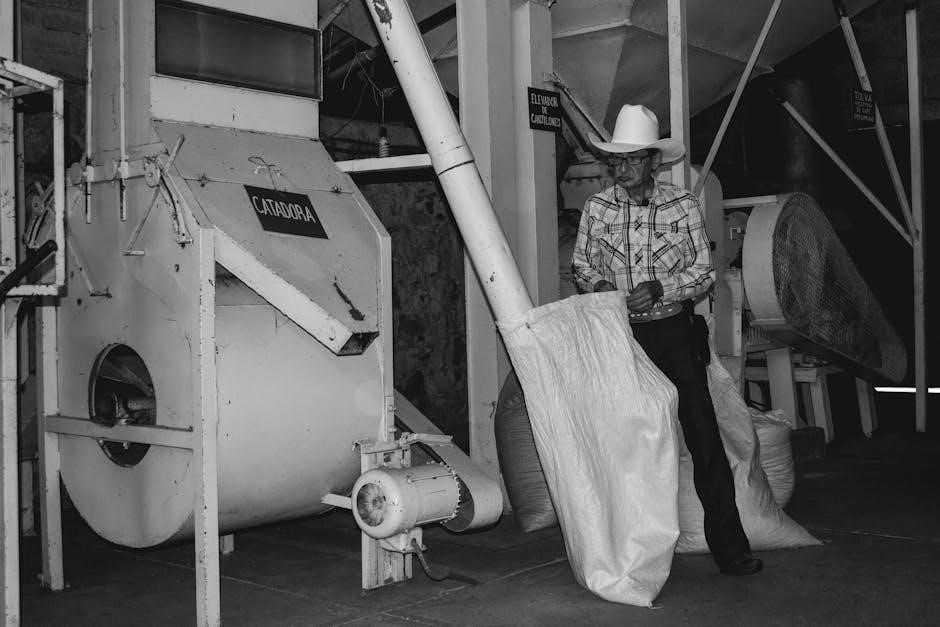
Choosing between a manual and electric coffee grinder depends on your preferences and brewing habits. Manual grinders are more affordable, starting around $10-$20, and offer a tactile experience. Electric grinders are faster, more efficient, and versatile for various brewing methods, but come at a higher cost.
Coffee grinders are essential tools for coffee enthusiasts, enabling the transformation of whole beans into the perfect grounds for brewing. Freshly ground coffee preserves the bean’s aroma and flavor, making it a crucial step in achieving a great cup. There are two primary types of grinders: manual and electric, each catering to different needs and preferences. Manual grinders are simple, cost-effective, and offer a hands-on experience, while electric grinders provide speed and convenience, often with adjustable settings for various brewing methods. Whether you’re a casual drinker or a dedicated aficionado, choosing the right grinder can elevate your coffee game. This guide explores the pros and cons of each type, helping you decide which grinder aligns with your lifestyle and coffee goals.
Why Freshly Ground Coffee Matters
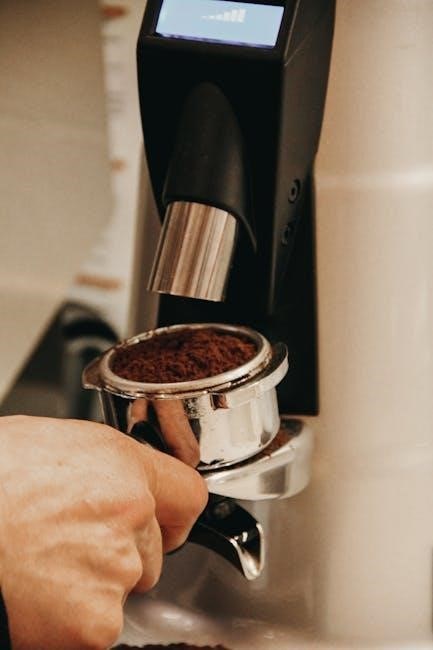
Freshly ground coffee is the cornerstone of a perfect cup, as pre-ground beans lose flavor and aroma rapidly. Grinding beans just before brewing ensures maximum freshness, preserving the delicate oils and gases that give coffee its vibrant taste. When beans are ground, they are exposed to air, which accelerates oxidation and leads to a stale, bitter flavor. Fresh grinding prevents this, allowing you to enjoy the full complexity of your coffee. Additionally, the grind size plays a critical role in different brewing methods, and freshly ground beans enable precise control. Whether using a manual or electric grinder, the act of grinding brings you closer to the coffee-making process, enhancing the overall experience. Investing in fresh grinding elevates your coffee ritual, making every sip more flavorful and satisfying.
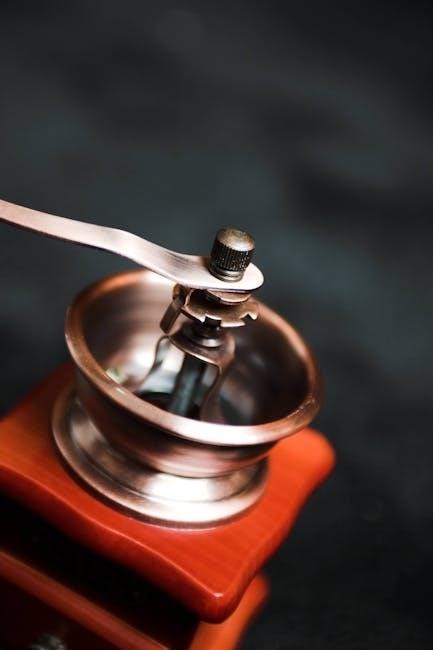
Manual Coffee Grinders
Manual coffee grinders are budget-friendly, starting at $10-$20, and provide a tactile experience. They are ideal for those who value simplicity and control over their grind without the need for electricity.

The Pros of Manual Grinders
Manual coffee grinders offer several advantages for coffee enthusiasts. They are highly cost-effective, with prices starting as low as $10-$20, making them an excellent choice for budget-conscious buyers. Unlike electric grinders, manual grinders do not require electricity, making them portable and ideal for travel or camping. The hands-on process provides a tactile experience, allowing users to feel connected to their coffee-making ritual. Additionally, manual grinders are quieter and produce less heat, which can preserve the delicate flavors and aromas of the coffee beans. They also offer precise control over grind size, which is essential for achieving the perfect brew. Many manual grinders are compact and easy to clean, adding to their practicality. For those who value simplicity and a more personal connection to their coffee, manual grinders are a fantastic option.
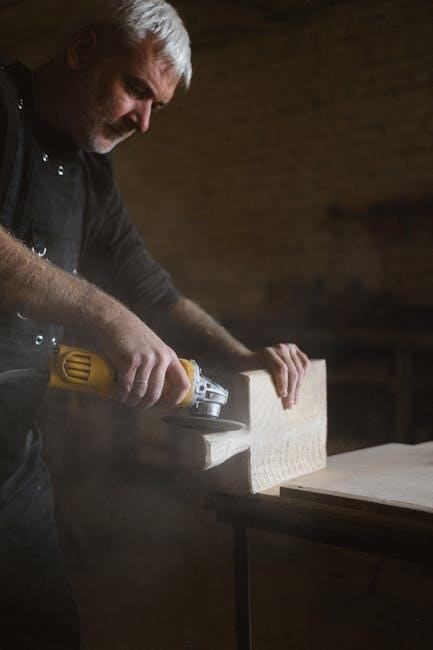
The Cons of Manual Grinders
While manual coffee grinders have their benefits, they also come with some drawbacks. One of the main disadvantages is the time and effort required to grind the beans manually. This can be particularly inconvenient for those who need to prepare large quantities of coffee or are short on time. Additionally, manual grinders may not be as efficient at producing very fine grinds, such as those needed for espresso, which can be a limitation for some users. The process can also be physically demanding, especially for extended grinding sessions. Furthermore, manual grinders often have smaller capacities, meaning they may need to be refilled more frequently. Despite these challenges, many coffee enthusiasts find the manual grinding process rewarding and worth the extra effort for the quality and control it provides.

Electric Coffee Grinders
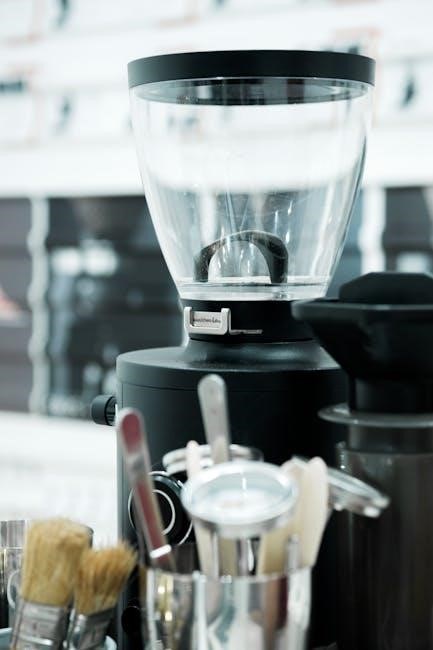
Electric coffee grinders offer efficiency and speed, making them ideal for quick grinding. They are versatile for various brewing methods but generally cost more than manual grinders, starting at higher price points.
The Pros of Electric Grinders
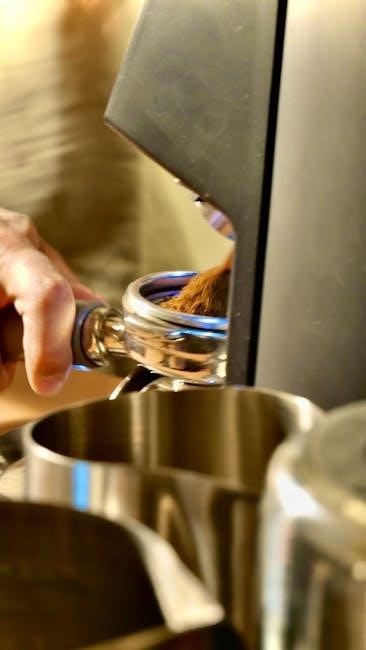
Electric coffee grinders offer unmatched convenience and speed, allowing you to grind beans quickly and efficiently. They are ideal for busy households or offices where time is of the essence. With versatile settings, electric grinders can accommodate a wide range of brewing methods, from fine espresso to coarse French press. Many models come with additional features like timers and multiple grind settings, ensuring precision and consistency. They are also capable of handling larger quantities of coffee, making them perfect for entertaining guests or for those who consume multiple cups daily. Furthermore, electric grinders are low-effort, requiring minimal physical input compared to manual grinders. Their durability and ease of use make them a practical choice for coffee lovers seeking a hassle-free experience. Overall, electric grinders are a great investment for anyone prioritizing efficiency and versatility in their coffee routine.
The Cons of Electric Grinders
Electric coffee grinders come with several drawbacks that may deter some users. One notable disadvantage is their higher cost compared to manual grinders, with prices starting significantly higher. They also generate heat during grinding, which can potentially damage the beans and alter their flavor profile. Additionally, electric grinders are generally louder, making them less ideal for early morning use or shared living spaces. Their bulkier design takes up more storage space, which can be a concern for those with limited kitchen counter space. Maintenance can also be more challenging, as some parts may not be dishwasher-safe and require careful cleaning. Furthermore, electric grinders rely on electricity, making them less portable for travel or camping. While they are convenient, these cons may make manual grinders a more appealing option for some coffee enthusiasts who prioritize simplicity, affordability, and portability.
How to Choose the Right Grinder
Consider your budget, brewing method, and lifestyle. Manual grinders are ideal for simplicity and portability, while electric grinders offer speed and convenience for daily use. Choose based on your needs.
Understanding Grind Settings and Coarseness
Mastering grind settings and coarseness is crucial for achieving the perfect brew. The coarseness of the grind directly impacts the flavor, with different brewing methods requiring specific textures. For instance, espresso demands a fine grind, while French Press needs a coarse one. Manual grinders often provide precise control over coarseness, allowing users to adjust the grind to suit their brewing method. Electric grinders, especially burr models, also offer adjustable settings, ensuring consistency across various grind sizes. Understanding how to set the right coarseness ensures optimal extraction, preventing bitter or sour flavors. Whether you prefer manual or electric, adjusting the grind size according to your brewing technique is essential for bringing out the full aroma and taste of your coffee beans.
Cost Considerations
Cost is a significant factor when deciding between manual and electric coffee grinders. Manual grinders are generally more affordable, with entry-level models starting around $10-$20. They are a great option for those on a budget or who value simplicity. Electric grinders, while more expensive, offer convenience and efficiency, with prices ranging from $50 to over $200 for high-end models. The choice depends on your brewing frequency and needs. If you prioritize affordability and don’t mind a bit of manual effort, a hand grinder is ideal. However, if you seek speed and versatility for various brewing methods, investing in an electric grinder may be worthwhile. Balancing your budget with the features you need will help you make the best decision for your coffee routine.